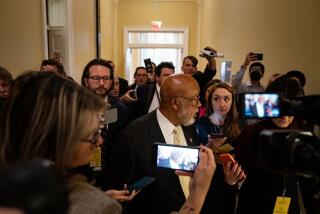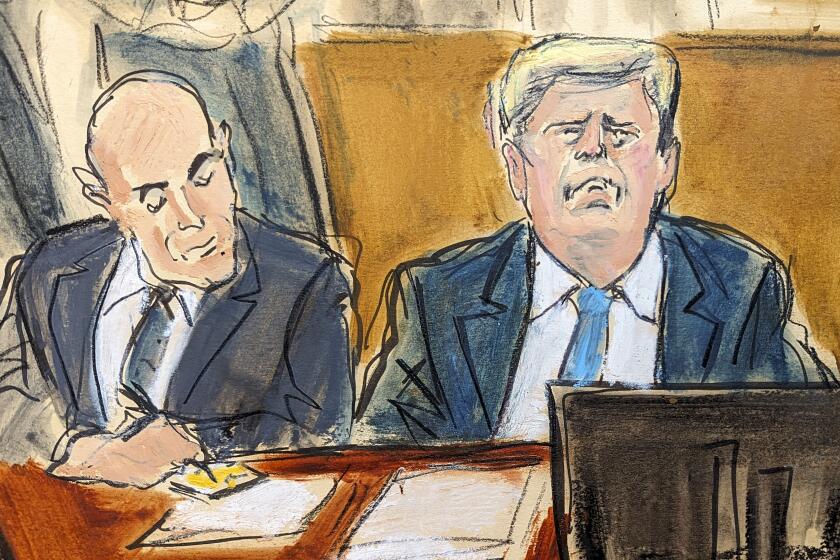Senators Queasy Over Starr Report
Senators in both political parties are squirming at the very notion of a long, graphic impeachment trial that brings to life on the Senate floor the explicit report prepared by independent counsel Kenneth W. Starr.
While some senators say that the occasionally X-rated details of the Starr report could be discussed in closed session or avoided entirely, the prospect of testimony dealing with President Clinton’s liaisons with Monica S. Lewinsky is a driving force in the search for a compromise short of trial.
“If either side decides they have to put on witnesses, this is going to be a very long and traumatic trial,” warned Sen. Joseph I. Lieberman (D-Conn.).
Lieberman, who has condemned Clinton for setting a bad example for children, argued in a recent television interview on PBS that the prospect of more graphic testimony on television ought to prompt senators to seek a quick compromise.
Although impeachment proponents downplay the sexual nature of the case, the perjury allegations against the president focus on Clinton’s characterization of his relationship with Lewinsky.
In building his case, Starr called Lewinsky before the grand jury to describe in detail each of her sex acts with the president. Lewinsky’s friends were called to corroborate her descriptions of illicit groping in the hallway off the Oval Office.
So far, Lewinsky has heard nothing about possible testimony before the Senate, according to an associate of the former White House intern. The associate said that Lewinsky looks forward to telling her story in public “but in a setting more of her choosing than a Senate trial of the president.”
No Word From Senate for Jordan
Another witness before Starr’s grand jury, presidential confidant Vernon E. Jordan Jr., also has received no word about testimony before the Senate, said his attorney, Bill Hundley.
“Vernon is not anxious to testify again,” Hundley said. “We’ll do what we have to do. We’re not going to duck it. But . . . we’d just as soon skip it.” Those pressing for a full airing of the case say that the Senate could decide to turn off the C-SPAN cameras, clear the galleries of reporters and members of the public and hear part of the case in private.
“I don’t think the children or the families of America should be subjected to that kind of testimony,” said Sen. Mitch McConnell (R-Ky.), who endorsed the notion of a closed session.
But trials across America are open to public inspection and any proposal to seal off the Senate’s proceedings on removal of the president likely would be controversial.
The tough decisions on how to proceed are expected to be put off until after the holiday season. But that has not stopped vigorous jockeying among politicians in both parties.
The White House has taken pains since the start of the week to yield to Senate sensitivities and not appear to be preempting the senators. Thus, Clinton aides stressed that whatever negotiations are taking place over resolving the impeachment matter short of a full trial are taking place between the Senate Republican majority and minority Democrats.
But Larry Stein, Clinton’s legislative affairs director and a former aide to Senate Minority Leader Tom Daschle (D-S.D.), is serving as the White House contact.
Hope for Setting General Course
The discussions, one official said, have not gotten close to a proposed deal. Still, there is hope that before the new Senate convenes on Jan. 6, a general course will have been set.
“If the Senate can find a way to end this soon after they come back Jan. 6, that, we believe, would be in everyone’s best interest,” said White House spokesman Joe Lockhart.
He said a letter sent Tuesday to Senate Majority Leader Trent Lott (R-Miss.) by four Republican House members “adds important voices to the call for a bipartisan solution.” The four, who voted for impeachment, urged Lott to consider censure of the president.
Lockhart added: “This letter is a positive sign that members on the Hill . . . don’t believe that the president should be removed from office and want to find a bipartisan way to put this behind us in a prompt manner.”
Although some Republicans are saying that a trial is inevitable, the push for a deal is bipartisan.
“We should lock . . . Lott, Sen. Robert Byrd, Bob Dole and George Mitchell in a room and not let them out until they come up with a solution which stops short of a trial, but goes far enough so the White House can’t claim a victory,” political analyst Rich Galen, a former aide to House Speaker Newt Gingrich (R-Ga.), said in a memo to reporters this week.
House members largely avoided the nitty-gritty details of presidential sex in debating Clinton’s ouster last week. Instead, lawmakers stuck to the broad legal charges of perjury, obstruction of justice and abuse of power.
But in presenting the evidence for trial, members of the House Judiciary Committee acknowledged that they may have to call forth witnesses such as Lewinsky and the woman who taped their telephone conversations, Linda Tripp, to recount the details of Starr’s report.
“The Senate will want specifics,” said a committee lawyer preparing for trial. “We’ll have to present evidence and testimony and not rely on transcripts.”
In a momentous step that has occurred just once before in history, the House approved articles of impeachment Saturday against a president. House members approved two of the four articles recommended by the Judiciary Committee, those accusing Clinton of lying under oath in his appearance before Starr’s grand jury and of obstructing justice in attempting to keep the relationship under wraps.
The remaining articles, accusing the president of lying during a deposition in the Paula Corbin Jones sexual harassment lawsuit and of abusing his power, were defeated.
In presenting their case, Judiciary Committee investigators said that they could stray beyond Clinton’s affair with Lewinsky and attempt to include details of other alleged sexual liaisons involving the president.
As part of its impeachment inquiry, the team assembled by Judiciary Committee Chairman Henry J. Hyde (R-Ill.) interviewed at least three women who claim sexual contact with Clinton--Kathleen E. Willey, who accused the president of groping her; Dolly Kyle Browning, a former classmate who has said that she had an affair with Clinton before he took office; and another unidentified Arkansas woman who has made conflicting allegations against Clinton.
While constitutional scholars disagree on whether the House Judiciary Committee could expand its presentation beyond the core case involving Lewinsky, the decision on how to proceed will ultimately lie with Supreme Court Justice William H. Rehnquist, who will preside over the trial, and the 100 senators.
Times staff writers Stephen Braun and Robert L. Jackson contributed to this story.
More to Read
Get the L.A. Times Politics newsletter
Deeply reported insights into legislation, politics and policy from Sacramento, Washington and beyond. In your inbox three times per week.
You may occasionally receive promotional content from the Los Angeles Times.






